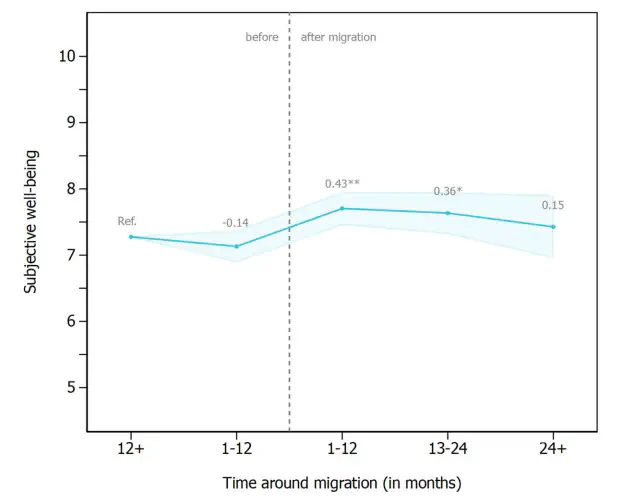New publication about the well-being of international migrants
This is one of the first studies that examines how the well-being of people changes in the course of international migration
 overview of hypotheses (H) about what might happen to the well-being of people when they move abroad
overview of hypotheses (H) about what might happen to the well-being of people when they move abroad
Moving abroad can both be a challenging but also rewarding event in people’s lives. Internationally mobile people often leave relevant others and material belongings behind and often find themselves in an unfamiliar environment, within which they sometimes even face reservations from the local population. As if all of this is not enough, moving abroad needs careful planning ahead, ensuring that crossing national borders and changing one’s place of residence is in accordance with all involved countries’ laws. Sounds quite stressful!
With so much stuff going on in the process of emigration, it’s hard to keep track of how well international migrants are doing overall. Clearly, just looking at how their income changes with the move doesn’t do justice to everything that is going on. We thus took a different approach an looked at shifts in the subjective well-being of individuals that are in the process of leaving their country to life somewhere else.
This study is unique as it is one of the first that is following people throughout their whole emigration process. This is made possible with the German Emigration and Remigration Panel Study (GERPS), a longitudinal study that is representative of the internationally mobile German population.
The results in a nutshell
We are able to show a general increase in people’s well-being during their emigration. Importantly, this increase is not short-term as well-being remains elevated in the first years after migration. The extent of the change in well-being thereby systematically depends on negotiation processes related to the migration decision: accompanying individuals (so-called trailing partners) experience the smallest gains in well-being compared to those who made the migration decision jointly with their partner or those who were the driving force behind the migration (so-called leading partners). Being unconstrained by a partner, singles even showed more pronounced increases in their well-being.
What can we learn from the study?
The study suggests that, despite its associated challenges, international migration is generally positive for people from affluent societies. The increasing internationalization of education and careers, along with subsequent high return rates, supports policies that promote international mobility as recurring events in people’s lives. However, the findings also highlight potential social inequalities between those who migrate internationally and those who don’t.
Get the article
If you are interested in reading the whole article, you can head over to Migration Studies. Don’t hesitate to get in touch with me if you lack access.
Credits
This article is collaborative work with my dear colleagues Nico Stawarz, Andreas Ette, and Heiko Rüger from the Federal Institute for Population Research (BiB).